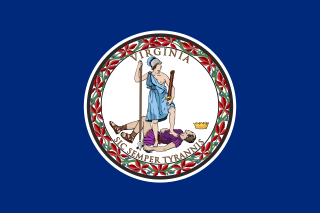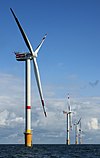The secondary sector of the economy includes industries that produce a finished, usable product or are involved in construction.

Battelle Memorial Institute is a private nonprofit applied science and technology development company headquartered in Columbus, Ohio. Battelle is a charitable trust organized as a nonprofit corporation under the laws of the State of Ohio and is exempt from taxation under Section 501(c)(3) of the Internal Revenue Code because it is organized for charitable, scientific and education purposes. The institute opened in 1929 but traces its origins to the 1923 will of Ohio industrialist Gordon Battelle which provided for its creation. Originally focusing on contract research and development work in the areas of metals and material science, Battelle is now an international science and technology enterprise that explores emerging areas of science, develops and commercializes technology, and manages laboratories for customers.
Energy policy is the manner in which a given entity has decided to address issues of energy development including energy production, distribution and consumption. The attributes of energy policy may include legislation, international treaties, incentives to investment, guidelines for energy conservation, taxation and other public policy techniques. Energy is a core component of modern economies. A functioning economy requires not only labor and capital but also energy, for manufacturing processes, transportation, communication, agriculture, and more.

The National Energy Technology Laboratory (NETL) is a U.S. national laboratory under the Department of Energy Office of Fossil Energy. NETL focuses on applied research for the clean production and use of domestic energy resources. NETL performs research and development on the supply, efficiency, and environmental constraints of producing and using fossil energy resources, while maintaining their affordability.
Off-the-grid is a system and lifestyle designed to help people function without the support of remote infrastructure, such as an electrical grid. In electricity, off-grid can be stand-alone power system or microgrids typically to provide a smaller community with electricity.
The Association for Environment Conscious Building (AECB) is the leading network for sustainable building professionals in the United Kingdom. Membership of the AECB includes local authorities, housing associations, builders, architects, designers, consultants and manufacturers. The association was founded in 1989 to increase awareness within the construction industry of the need to respect, protect, preserve and enhance the environment and to develop, share and promote best practice in environmentally sustainable building.
EcoHomes was an environmental rating scheme for homes in the United Kingdom. It was the domestic version of the Building Research Establishment's Environmental Assessment Method BREEAM, which could also be applied to a variety of non-residential buildings. It was replaced by the Code for Sustainable Homes in April 2008.

The Climate Change and Sustainable Energy Act 2006 is an Act of the Parliament of the United Kingdom which aims to boost the number of heat and electricity microgeneration installations in the United Kingdom, so helping to cut carbon emissions and reduce fuel poverty.

In 2005 the government of Sweden appointed a commission to draw up a comprehensive programme to reduce Sweden's dependence on petroleum, natural gas and other ‘fossil raw materials’ by 2020. In June 2006 the commission issued its report, entitled Making Sweden an Oil-Free Society. The report cited four reasons to reduce oil dependence:

The Ecologist Green Party, formerly known as the Ecologist Party of Moldova "Green Alliance" is a green political party in Moldova.
Energy poverty is lack of access to modern energy services. It refers to the situation of large numbers of people in developing countries and some people in developed countries whose well-being is negatively affected by very low consumption of energy, use of dirty or polluting fuels, and excessive time spent collecting fuel to meet basic needs. It is inversely related to access to modern energy services, although improving access is only one factor in efforts to reduce energy poverty. Energy poverty is distinct from fuel poverty, which focuses solely on the issue of affordability.

The Energy Independence and Security Act of 2007 is an Act of Congress concerning the energy policy of the United States. As part of the Democratic Party's 100-Hour Plan during the 110th Congress, it was introduced in the United States House of Representatives by Representative Nick Rahall of West Virginia, along with 198 cosponsors. Despite Rahall becoming 1 of only 4 Democrats to oppose the final bill, it passed in the House without amendment in January 2007. When the Act was introduced in the Senate in June 2007, it was combined with Senate Bill S. 1419: Renewable Fuels, Consumer Protection, and Energy Efficiency Act of 2007. This amended version passed the Senate on June 21, 2007. After further amendments and negotiation between the House and Senate, a revised bill passed both houses on December 18, 2007 and President Bush, a Republican, signed it into law on December 19, 2007, in response to his "Twenty in Ten" challenge to reduce gasoline consumption by 20% in 10 years.
The International Solar Energy Society (ISES) is a global organization for promoting the development and utilisation of renewable energy. ISES is a UN-accredited NGO headquartered in Freiburg im Breisgau, Germany. Dr David S. Renné is the current president.

US energy independence relates to the goal of reducing the United States imports of petroleum and other foreign sources of energy. Energy independence is espoused by those who want to leave the US unaffected by global energy supply disruptions, and to restrict reliance upon politically unstable states for its energy security. Energy independence is highly concerned with oil, the source of the country's principal transport fuels.

Energy in Armenia describes energy and electricity production, import and consumption in Armenia.
The American Council for an Energy-Efficient Economy, or ACEEE, is a nonprofit, 501(c)(3) organization. Founded in 1980, ACEEE's mission is to act as a catalyst to advance energy efficiency policies, programs, technologies, investments, and behaviors in order to help achieve greater economic prosperity, energy security, and environmental protection.

The energy sector in Switzerland is, by its structure and its importance, typical of a developed country. Apart from the hydro and biomass, the country has few indigenous energy resources: petroleum, gas and nuclear fuel are imported, so that in 2006 only 15% of final requirements have been covered by local resources.

The Scottish Democratic Alliance (SDA) is a political organisation formed in 2009 as the successor to the Scottish Enterprise Party (SEP). It supports Scottish independence and withdrawal from the European Union. Although it evolved from a political party, the SDA spent some time operating as a think tank on current affairs in Scotland. It stood its first candidate for election in the Aberdeen Donside by-election, 2013, coming last with 35 votes (0.1%).
Energy in Cyprus describes energy and electricity production, consumption and import in Cyprus. Energy policy will describe the politics of Cyprus related to energy more in detail. Cyprus is a member of European Union and non-OECD country.

Wind power in Virginia is in the early stages of development. In March 2015, Virginia became first state in the United States to receive a wind energy research lease to build and operate offshore wind turbines in federal waters.












